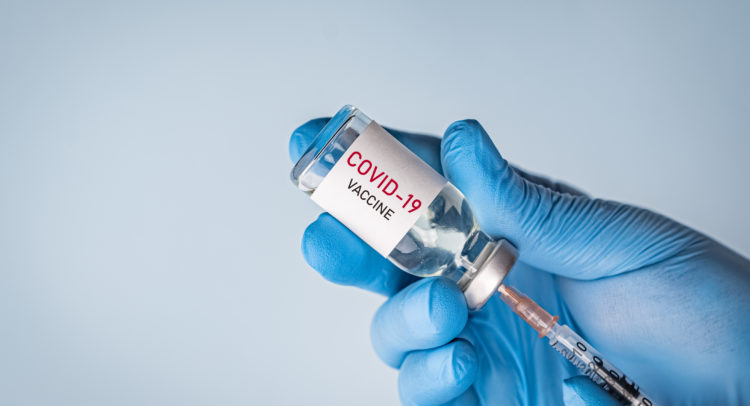Pfizer (NYSE:PFE) and Moderna (NASDAQ:MRNA) are the big-two COVID-19 vaccine makers that have seen shares fall back to Earth in recent months. Although both stocks may look tempting to investors, I believe Pfizer may have more upside potential.
Confident Investing Starts Here:
- Easily unpack a company's performance with TipRanks' new KPI Data for smart investment decisions
- Receive undervalued, market resilient stocks straight to you inbox with TipRanks' Smart Value Newsletter
Undoubtedly, we’re still in a pandemic, but things are pretty much back to normal. America has reopened its doors, and things are unlikely to change, even if a new Omicron variant sparks an outbreak for the fall or winter season.
Indeed, booster shots are a major reason the American economy can keep its doors open as the coronavirus continues spreading. We’ve learned to live with the disease, and with no end to the pandemic in sight, Pfizer and Moderna stand to continue extending their vaccine windfalls.
In due time, the pandemic will end, and demand for vaccines could begin to fall alongside the severity of future strains. Nobody expected Pfizer or Moderna’s COVID-19 businesses to continue raking in impressive cash flows forever. Each stock sports a low single-digit price-to-earnings (P/E) multiple in anticipation of a drastic fall-off in vaccine demand.
In any case, Pfizer and Moderna are two biopharma companies with innovation in their veins. The potential of mRNA technology could have the potential to be far-reaching, and it’s these two plays that seem like terrific buys on the dip, even as they move beyond COVID-19.
With Moderna going after Pfizer and BioNTech for COVID-19 vaccine patent infringement, the two COVID-19 rivals could find themselves in a legal tussle for quite some time. In any case, don’t expect such a suit to impact supply ahead of future COVID-19 waves.
Let’s look closely at Pfizer and Moderna to see how each firm stacks up going into a recession year and a post-COVID environment.
Pfizer
Pfizer is a biopharma behemoth that’s been on quite a spending spree of late, with the acquisition of Biohaven Pharmaceuticals for $11.6 billion and Blood Therapeutics for $5.4 billion. Such deals are intriguing and seem to be a terrific use of excess funds from the COVID-19 business.
As Pfizer continues making considerable sums on booster shots, investors can expect Pfizer to continue to pursue opportunities in the space to keep its pipeline full and its growth rate elevated.
Undoubtedly, Pfizer doesn’t have a track record for growth. It’s a $260 billion behemoth that’s been weighed down by a generics business for many years. With the generics business spun off and a new focus on growth, Pfizer seems more than capable of growing like a firm that’s a fraction of its size.
The Biohaven and Blood Therapeutics deals add an impressive portfolio of drugs aboard, as well as promising candidates that could have blockbuster potential in the future. With Biohaven, Pfizer gains a promising migraine business and third-generation glutamate-modulation platform Troriluzole, among other very intriguing offerings. The migraine franchise should do wonders for helping Pfizer hold its own in the latter half of the decade once the COVID-19 business winds down.
It isn’t just the migraine business that’s intriguing. Troriluzole is in phase three of clinical trials for treating OCD (obsessive-compulsive disorder) and Spinocerebellar Ataxia (SCA). The drug has blockbuster potential and could help Pfizer transition into a post-Comirnaty world.
Pfizer is readying for the end of the COVID-19 windfall, but the COVID business may still have room to run into 2023 or even 2024. It’s hard to tell when the pandemic will end, but even if it doesn’t, Pfizer’s boosters and oral treatments will be vital in keeping things normal for the duration of the pandemic.
Pfizer stock looks like a cheap biopharma stock to make it through a recession year. At writing, the stock trades at 8.9 times trailing earnings and just 2.7 times sales.
Is Pfizer Stock a Buy, Sell, or Hold?
Wall Street is bullish but muted on Pfizer stock with a Moderate Buy consensus rating. This is based on four Buys and seven Holds assigned in the past three months. With an average PFE stock price target of $56.20, analysts expect 22% upside potential.

Moderna
Moderna is betting big on mRNA technology, with a pipeline full of innovations with blockbuster potential. Unlike Pfizer, Moderna has more to lose if COVID-19 vaccine demand dissipates. In any case, demand may not be so quick to fade as the world gears for another wave of spread. In the latest quarter, Moderna saw COVID-19 vaccine revenues rise 8%. The company is on its way to hitting its $21 billion sales estimate.
Beyond COVID-19, Moderna stock is more of a question mark. Various vaccine trials — including RSV (respiratory virus) — are in the late stages and could help spark the next leg higher for the stock, even if the economy falls into a recession over the next few months.
Indeed, Moderna stock has the potential to fuel a lowly-correlated return moving forward. In any case, it’s all about boosters as the firm pushes for its next big thing. For a firm that delivered one of the biggest innovations with Spikevax over the past few years, I think Moderna can pull off another breakthrough.
For now, investors are curbing their expectations. The stock boasts a 4.6 times trailing earnings multiple and a 2.7 times sales multiple. That’s not at all indicative of a pioneer in a nascent market full of potential. I don’t think Moderna stock is a trap or a one-hit wonder, even if vaccine demand were to sink rapidly through 2023. The pipeline is full of too much promise.
What is the Price Target for MRNA Stock?
Wall Street expects Moderna’s returns to be promising over the next year. Similar to Pfizer, analysts have a Moderate Buy consensus rating on Moderna based on four Buys, five Holds, and one Sell. However, with an average MRNA stock price target of $209.60, the upside potential equates to 50.8%.

Takeaway: Pfizer Might be the Better Buy
Moderna and Pfizer are both great bets following their recent declines (23% and 71%, respectively). However, at this juncture, I prefer Pfizer stock because it looks better prepared for a move into a post-pandemic environment.










